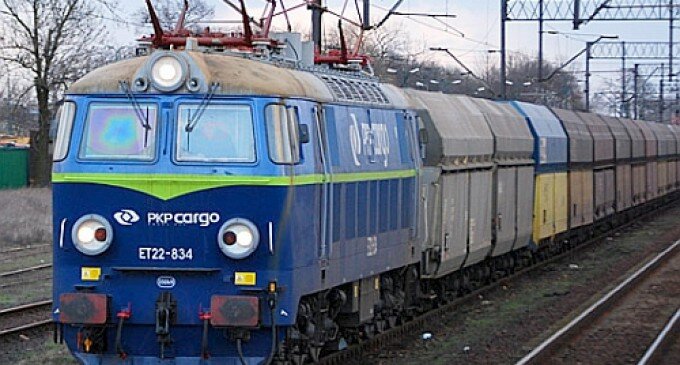PKP CARGO enhances presence in the Czech Republic and Slovakia

At the end of September 2014, the Czech regulator issued a test certificate for ST44 series PKP CARGO diesel locomotives. The Polish carrier can now enter the Czech Republic using six different locomotive types. It can also use them in Slovakia. These engines will be a reserve pool for electric multi-system Siemens locomotives.
“The strategy of PKP CARGO envisages organic growth abroad. We do not make wild promises. In order to meet the demand for our services, we are preparing more locomotives that can operate on tracks outside Poland. Whenever possible, it is a good idea to adapt the engines we already have to operate on tracks abroad. This way we have obtained permission for as many as six types of locomotives from the PKP CARGO rolling stock to enter the Czech Republic and Slovakia. Soon we will also issue an invitation to tender for multi-system locomotives, to be used on significantly longer routes. This way we want to continue increasing PKP CARGO’s share in foreign markets”, says Wojciech Derda, Chief Operations Officer at PKP CARGO.
ST44 is a heavy diesel locomotive produced from the 1960s to the end of 1980s in Lugansk, in the Donets Basin (currently Ukraine). PKP CARGO’s locomotives which have been allowed to operate on Czech and Slovak tracks have been modernised by the PESA plant in Bydgoszcz. Their equipment includes a radiotelephone used in the Czech Republic, which is mandatory for every locomotive operating in that country. The locomotives have also been fitted with safety assurance systems working in tandem with Czech and Slovak track-side devices.
Apart from ST44, the locomotives used by PKP CARGO on routes in the Czech Republic and Slovakia include ST45 and SM42 diesel locomotives, as well as electric locomotives: multi-system Siemens E189 and single-system ET22 and ET41 locomotives, both of which are produced in Poland. Due to the specific nature of traction in those countries, ET22 and ET41 locomotives can carry out transports only in the northern part of the Czech Republic and Slovakia. Tracks in the southern part of both countries are operated by PKP CARGO using multi-system locomotives or diesel traction. This is due to the fact that both countries use more than one supply voltage for railway lines: 3,000 V DC, just like in Poland, and 25,000 V AC, 50 Hz, which requires appropriate devices in electric locomotives.
As regards railway transport, the Czech and Slovak markets are mainly transit-oriented. The Czech Republic has one of the best developed rail networks in Europe, with 12 km of tracks per 100 km2. This is almost twice more than in Poland (6.7 km per 100 km2). In 2012, a total of 83 million tonnes of goods were carried by rail, with the total load-carrying effort of more than 14 billion tonne-kilometres. More than 60 percent of them were transports of fossil fuels. Metal ores, as well as coke and oil derivatives were other goods frequently transported in the Czech Republic, accounting for 7.3 percent and 5.5 percent of all transports in this period, respectively. The largest freight carrier in the Czech Republic is the state-owned company CD Cargo, with a market share of almost 80 percent. The second largest carrier in terms of the transported volume is the private company AWT, which PKP CARGO intends to take over. AWT has a market share of ca. 8 percent.
In terms of the transported volume, the Slovak market is two times smaller than the Czech one. In 2012, over 43 million tonnes of goods were transported by rail in Slovakia, 85 percent of which were imports, exports or transit. The market is dominated by products related to metallurgical industry: metal ores (ca. 35 percent), as well as metals and fabricated metal products (ca. 11.5 percent). This structure is largely influenced by the operation of the steel mill in Košice, the largest plant of this kind in the country. This plant, owned by U.S. Steel, is the major recipient of the freight transport services in the market. A significant share in the Slovak market is held by transports of fuels: hard bituminous coal and brown coal, crude oil and natural gas (ca. 12.5 percent in total).
The position of PKP CARGO in the Czech Republic and in Slovakia can be strengthened by acquiring local carriers. In September, PKP CARGO signed a letter of intent which guaranteed it exclusive rights to negotiate potential acquisition of the above-mentioned company AWT. The Czech company carries out rail transports in several countries, including Slovenia, Romania, Bulgaria and Croatia.
To carry out independent transport operations, a foreign carrier has to hold so-called part B of the safety certificate, which is issued by the national regulator. PKP CARGO obtained this document from Slovaks in 2011. Recently, it has been extended until May 2019. The Czechs issued a certificate to the Polish carrier in 2010. It remains valid until January 2015. PKP CARGO may carry out independent transport operations in eight countries, including – besides the Czech Republic and Slovakia – Germany, Austria, Belgium, the Netherlands, Hungary and Lithuania.







There are no comments at the moment, do you want to add one?
Write a comment